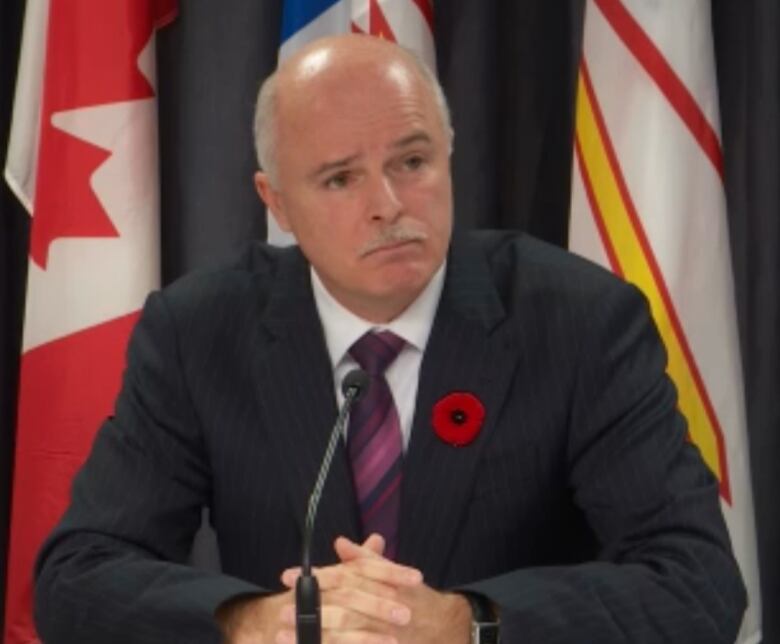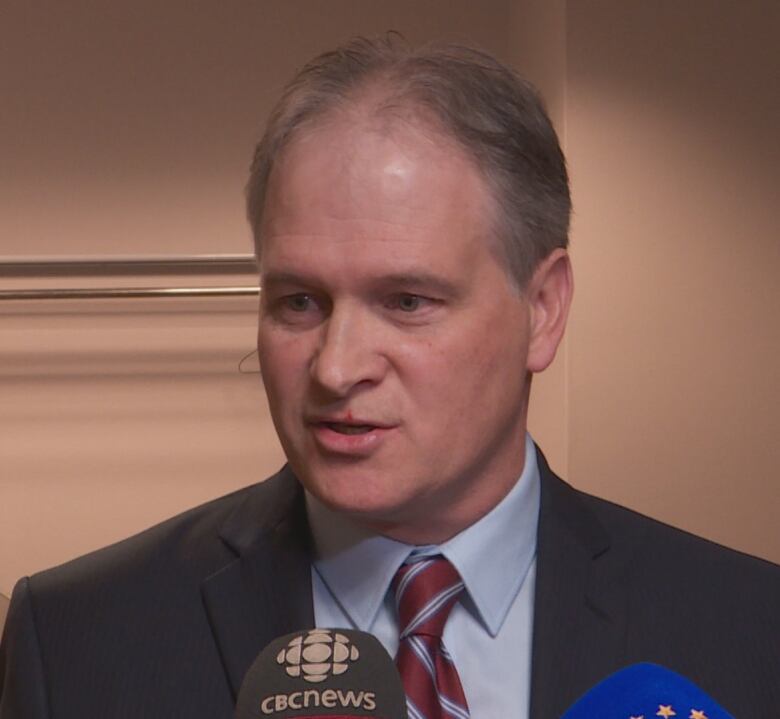Softer shade of red, as N.L. adjusts deficit projection
Corner has not yet been turned, finance minister says, but 'it is clearly in sight'

Newfoundland and Labrador's financial position has improved since last spring, although the revised deficit still stands at $547 million,Finance Minister Tom Osborne said Tuesday.
Eight months ago, the government had expected to carry a deficit for this fiscal year of $683 million.
Speaking to reporters, Osborne said the government has "not yet turned a corner [but] it is clearly in sight."
The governing Liberals are a year away from a scheduled election. Nonetheless, Osborne took aim at the former Tory government for leaving his government with a mess, particularly because of the Muskrat Falls hydroelectric development.
Osborne said the government's "single biggest challenge" remains Muskrat Falls, and pointed out that about 30 per cent of the province's debt is now attributed to the hydroelectric megaproject.
Osbornepresenteddetails of the annual fall fiscal update at Confederation Building, including updated data on the targets that the Liberal government set in its budget.
The government is predicting they are on target to return to a budget surplus in 2022-2023.
Role of oil price
The price of oil continues to be an influential factor in the government's treasury.
When the budget was tabled in late March, the government was forecasting Brent crude to trade at an average price of $63 US per barrel.
Since then,Brent a North Sea crude that is a benchmark for the Newfoundland and Labrador industry, because of its similarity to the oil produced here has traded well above that mark, peaking above $86 US earlier this month.
In a briefing Tuesday, the Department of Finance said every extra dollar on the price of oil translates into provincial revenue of $19.9 million.
The government was also banking on the Canadian dollar trading at 79 cents US. For the most part, the loonie has traded slightly lower than that. The government now is pegging the dollar at 77 cents.
Finance officials noted that every time the dollar drops a cent, there's an improvement to the provincial treasury of $19.5 million.
Unemployment on the decline
The province's unemployment rate has dropped slightly from 14.8 per cent to 14.5 per cent since the budget.
Osborne said employment growth has been strong in recent months.
He added that government expectsthe unemployment rate to continue shrinkinginto 2019.
Meanwhile, the employment participation rate jumped 1.2 per cent from the spring budget, from 57.8 per cent to 59 per cent of the population now earning an income.
Status quo,says Hutchings
Opposition House Leader Keith Hutchings, however, was not impressed.
"There's no real improvement here," said Hutchings, noting that the fiscal update maintains the status quo and includes some extra revenue.
Hutchings said he has concerns about spending increases over the past number of years, and that the government target of returning to surplus cannot be hit under current practice.
"Moody's even said it's unlikely in the fourth year of mandate that a government is going to do what it needs to do in regards to expenditures," said Hutchings, referring to the U.S.-based ratings agency.
"So there's no confidence here that the goals are going to be met. Let's call it what it is," he said.

Hutchings is critical of the provincial Liberals' heavy reliance on oil revenues something, he said, the Liberalswere frequently criticized his party of in the past.
"There's no economic diversification here, they've talked about it. There's no proof of it," he said.
"The [auditor general] mentioned a couple of years ago that the seven-year plan they laid out is not conceivable, you can't get to it. So I don't know what this is about today."












_(720p).jpg)


 OFFICIAL HD MUSIC VIDEO.jpg)
.jpg)



























































































